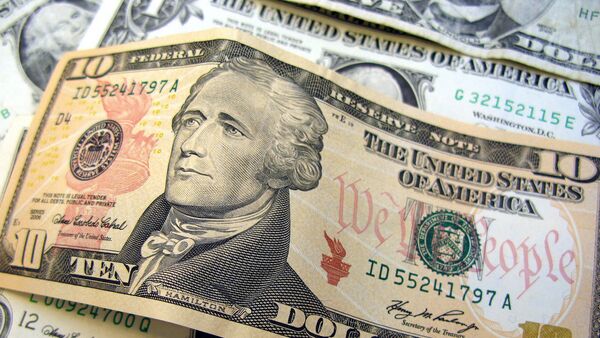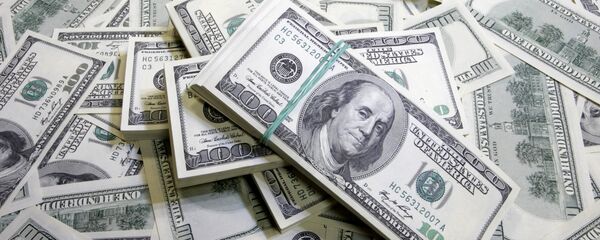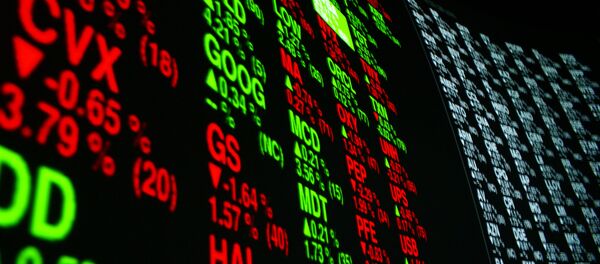The US dollar has declined in value this week after Donald Trump, who was sworn in as US President on Friday, expressed concern about the currency's recent appreciation.
The US Dollar Index, which measures the greenback relative to a basket of six other major world currencies, dipped by 1.2 percent to 100.3 on Tuesday after Trump told the Wall Street Journal that the dollar was "too strong."
"Our companies can't compete with [China] now because our currency is too strong. And it's killing us," Trump continued.
Sireen Harajli, a currency strategist at Mizuho Bank Ltd in New York, told Radio Sputnik that a strong dollar has hurt the US manufacturing sector in the past, but it does not appear to be having that effect at the moment.
"Right now, there is no clear evidence that the dollar's strength is a real problem for the US economy. That is not to say that that may change as US exports become more expensive, so it may have some impact there," Harajli said.
"However, some of those effects may be offset by growth and other aspects of the economy, so it may not be such a big issue. A lot of it depends on economic growth."
Trump's comment was interpreted by the markets to be referring to the general strength of the dollar, rather than just its relation to the renminbi.
"I think it goes along the lines that an excessively strong dollar can hurt the manufacturing sector, and I think Mr. Trump made it very clear that reviving the American manufacturing sector is a priority for his administration, so I think it's more of a general dollar theme for him."
After rising by as much as six percent following Trump's election, the US Dollar Index is now 2.9 percent higher than it was on November 8. Markets expect Trump's tax and spending policies to encourage inflation and a corresponding increase in interest rates by the US Federal Reserve.
"I think the Fed is going to look at inflation, I think that's where the big change might occur. If President Trump manages to put in place the policies that he's been talking about, some of those may be inflationary. We can expect to see stronger wage growth as well as higher inflation. So as a response, the Fed will likely continue its tightening cycle but perhaps at a faster pace," Harajli said.
"We expect the Fed to raise rates three times, we think it's going to happen in the second half of the year mostly."
Likely areas of reform for the Trump administration include the tax system, since the majority-Republican Congress is likely to support cuts to corporate and personal taxes. Trump has also pledged to increase infrastructure spending, which may meet with opposition from fiscal conservatives but receive more bipartisan support.
"I think he will manage some fiscal stimulus but it may not be a strong as some expect."
Trump's pledges to renegotiate trade deals are another factor affecting the dollar, and it remains to be seen whether he succeeds in renegotiating NAFTA and other trade deals.
Because of uncertainty about Trump's policy, the analyst doesn't expect much movement in the dollar in the first quarter of 2017, but in the longer term, "the dollar will continue to trade on a stronger bias."
"Overall we think the dollar will be trading stronger. We continue to believe in the kind of fiscal and economic policies we'll be getting from the new administration, and the Fed's reaction in terms of raising rates will be supportive for the dollar," Harajli said.
Trump's recent remarks about the dollar were a break with convention in recent years.
The Group of Twenty (G20) largest economies has established a protocol whereby heads of state, finance ministers and central banks traditionally don't mention the levels of their currency specifically, in order to avoid contributing to market volatility.
G20 finance ministers and central bankers also traditionally include a pledge to refrain from competitive devaluations and resist protectionism in their post-summit communiques.
In addition, since the Clinton administration, when Robert Rubin was Secretary of the Treasury, the US government has publicly favored a strong dollar, which was believed to have contributed to an economic boom by keeping inflation and interest rates low.
Have you heard the news? Sign up to our Telegram channel and we'll keep you up to speed!




